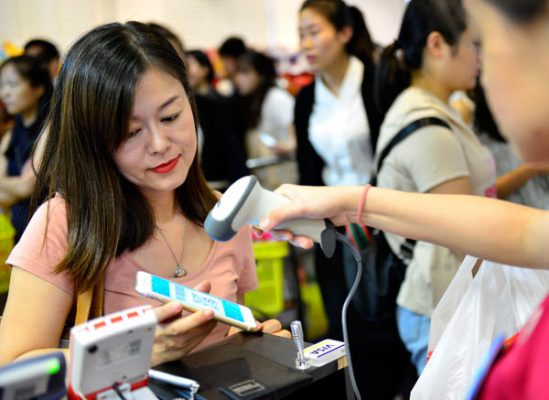
During the eight-day National Day holiday break, the number of Chinese consumers using the online payment method Alipay abroad surged seven times, and per capita spending has also jumped by nearly 50 percent, a new report said.
According to Alibaba’s affiliate Ant Financial Services Group, consumers born after 1990 accounted for 44 percent of those who used Alipay in foreign countries, and they spent 1,301 yuan ($196) on average during the holiday. Those who were born after 2000, spent an average of 532 yuan.
Meanwhile, Alipay has played an important role in helping Chinese travelers to simplify their tax reimbursements processes overseas. This year, Alipay has enabled Chinese consumers to get their tax refunds immediately through the payment method, and they don’t need to wait in long lines to get cash refunds. This has encouraged more people to apply for tax refunds, the report said.
Thanks to the convenience of Alipay, the total amount of tax refunds Chinese travelers obtained abroad through Alipay during the holiday soared 180 percent year-on-year, and their average tax refunds reached 922 yuan.
Alipay and WeChat have started to expand their overseas presence since late last year, in a bid to meet the increasing demand for shopping from Chinese travelers, and to cooperate with more local enterprises.
Several hundred thousand foreign retailers support payment through Alipay. Those include restaurants, supermarkets, convenience stores, duty free stores and theme parks, the Ant Financial report said.
Meanwhile, more airports, duty free stores and department stores overseas have started to accept WeChat. Galeries Lafayette in Paris, one of the most popular department stores among Chinese travelers, also began to accept WeChat Pay recently to attract more buyers.
Among those who used WeChat when they shopped abroad last week, 52 percent of consumers used it at duty free stores, followed by 16 percent at retail stores and 9.9 percent at drugstores, according to the latest report of popular instant messaging app WeChat.
Wang Pengbo, a senior financial analyst at market consultancy Analysis, said: “The market competition of online payment methods in China has been intense, and it has proved that it is well-received by consumers. Therefore, if they expanded abroad, it would help to fill the gap in the local market.
“As a priority, Alipay and WeChat pay will satisfy the increasing demand for shopping by Chinese travelers abroad. Besides, they will also increase the mergers and acquisitions of local enterprises overseas, and strengthen local market penetration.
“However, given the impact of local policy restrictions and different user habits, the growth of online payment methods like Alipay and WeChat abroad won’t be as rapid as they have been in China.”


